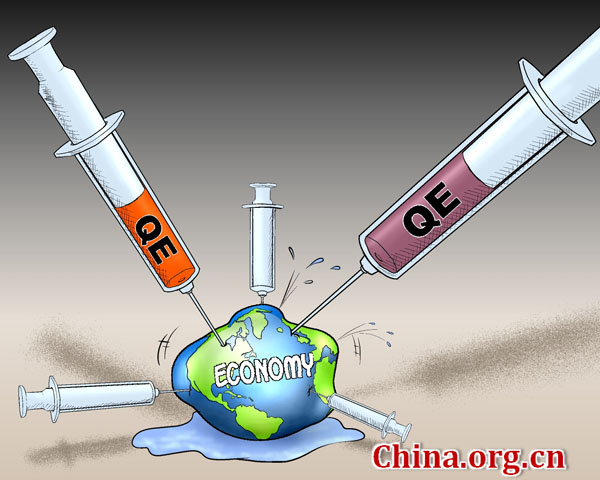EU economy could suffer the same fate as Japan
- By Jiang Shixue
 0 Comment(s)
0 Comment(s) Print
Print E-mail China.org.cn, September 15, 2014
E-mail China.org.cn, September 15, 2014
|
[By Jiao Haiyang/China.org.cn] |
How can we say whether a country is caught in a debt crisis or not? There is no definite definition. The former Italian Prime Minister Berlusconi reportedly said that Italy was not experiencing a debt crisis because restaurants in his country were filled with diners.
READ: ECB quantitative easing will harm the global economy again
Sadly, neither is there a well-recognized definition of "resolving the European debt crisis." Does it mean returning to a positive GDP growth rate? Or lowering the debt to GDP ratio and fiscal deficit to GDP ratio to the targets set in the European Union's Stability and Growth Pact, i.e. 60 percent and 3 percent respectively? Or a drop in the ten year bond spread to below 6 percent? Does it mean that bail-outs have ended? Or that there will be no more angry demonstrations in capital cities? Or that the Wall Street Journal, Financial Times and CNN will stop reporting on a "debt crisis? "
Despite the lack of a definition, we still can conclude that the European debt crisis is almost out of the woods. Even in Greece, where the crisis started, people are breathing a sigh of relief.
But the EU economic recovery has been quite disappointing. As a matter of fact, the EU economies seem to be in danger of going the same way as the Japanese economy, which is experiencing sluggish growth, low inflation or deflation and a heavy debt burden. Alan Wheatley, global economics correspondent for Reuters, once said that Eurozone governments would find it tough to keep the ugly new word "Japanization" out of their lexicon.
Many economists suggest that feeble economic growth is the core of a "Japanization trap." If the EU wishes to avoid the trap, it needs to jump start its economies as soon as possible.
Weak economic growth has also affected employment. In some countries, particularly in Greece and Spain, unemployment rates stand at higher than 20 percent and youth unemployment is at 50 percent, thus worsening social problems.
Disaffection with the economic and social situation could explain why anti-establishment parties gained widespread support in quite a few EU member countries during the European Parliament election in May 2014.
The European Central Bank (ECB) has an obligation to boost the EU economy. On June 5, 2014, it lowered the main re-financing rate to 0.15 percent, the marginal lending rate to 0.40 percent, and the deposit facility rate to minus 0.10 percent. Other measures included offering long-term loans to commercial banks at cheap rates until 2018.






